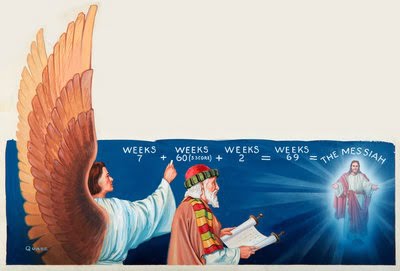Thursday: The Prophetic Calendar
At the end of the vision of the 2,300 evenings and mornings, the prophet is astonished because he cannot understand it (Dan. 8:27, NKJV). Ten years later, Gabriel comes to help Daniel “understand” the vision (Dan. 9:23). This latter revelation supplies the missing information and reveals that the work of the Messiah is to be accomplished toward the end of a period of seventy weeks. According to the year-day principle and the course of the events predicted, the seventy weeks must be understood as 490 years. And the starting point for this period is the command to restore and rebuild Jerusalem (Dan. 9:25).
This command is issued by King Artaxerxes in 457 B.C. It allows the Jews under the leadership of Ezra to rebuild Jerusalem (Ezra chapter 7). According to the biblical text, the seventy weeks are “determined” or “cut off”. This indicates that the time period of 490 years has been cut from a larger time period, that is, from the 2,300 years designated in the vision of chapter 8. It follows from this that the 2,300 years and the 490 years must have the same starting point, namely, 457 B.C.
The prophecy of the seventy weeks is divided into three sections: seven weeks, sixty-two weeks, and the seventieth week.
The seven weeks (49 years) most likely refer to the time during which Jerusalem will be rebuilt. After these seven weeks, there will be sixty-two weeks (434 years) leading to “Messiah the Prince” (Dan. 9:25). Thus 483 years after Artaxerxes’ decree, that is, in the year A.D. 27, Jesus the Messiah is baptized and anointed by the Holy Spirit for His messianic mission.
During the seventieth week, other crucial events will take place: (1) “Messiah shall be cut off” (Dan. 9:26, NKJV), which refers to the death of Christ. (2) The Messiah “shall confirm a covenant with many for one week” (Dan. 9:27, NKJV). This is the special mission of Jesus and the apostles to the Jewish nation. It is undertaken during the last “week”, from A.D. 27 to 34. (3) “But in the middle of the week He shall bring an end to sacrifice and offering” (Dan. 9:27, NKJV). Three and a half years after His baptism (that is, in the middle of the week), Jesus brings the sacrificial system to an end — in the sense that it no longer has any more prophetic significance — by offering Himself as the final and perfect sacrifice of the New Covenant, thus voiding the need for any more animal sacrifices. The last week of the 70-week prophecy ends in A.D. 34, when Stephen is martyred and the gospel message begins to reach not only the Jews but the Gentiles as well.
| Read Daniel 9:24-27. Even amid the great hope and promise of the Messiah, we read about violence, war, desolation. How can this help assure us that amid the calamities of life, hope still exists? |


Thank God for His provision everytime! If His care did not provide for us, what would? Without hope, how can a human being survive? Among so many sufferings in this planet? Thank God for His Love! His Son, who provides for us this hope, the only thing we can truly rely on.
There is something so significant about Daniel 9:25-27 that even the Rabbis, in their want to reject Christ, are said to have placed a curse on anyone reading these verses.
EG White says “The prophecy of Daniel pointed so unmistakably to the time of Messiah’s coming, and so directly foretold His death, that they discouraged its study, and finally the rabbis pronounced a curse on all who should attempt a computation of the time.” White, E. G. (1911). The Great Controversy Between Christ and Satan (Vol. 5, p. 378). Pacific Press Publishing Association.
But what curse is this they placed?
A Sage said: “May the curse of heaven fall upon those who calculate the date of the advent of the Messiah, and thus create political and social unrest among the people.” Sanhedrin, 97b. Taken from Louis Newman and Samuel Spitz, The Talmudic anthology: tales and teachings of the rabbis (Behrman House, 1945): 277. ISBN 0874413036, 9780874413038
“A most amazing thing occurs in the ninth chapter of Daniel: we’re told when Messiah would come. But instead of explaining it to us, our Rabbis curse anyone wanting to find it out: ‘Rabbi Samuel b. Nachmani said in the name (of) Rabbi Jonathan: ‘Blasted be the bones of those who calculate the end.’” Sanford R. Howard, L’Chayim: Finding The Light of Shalom (Thorsby, AL: Sabbath House, Inc., 1999), p. 209. Sanhedrin 97b, vol. 2, p. 659, Soncino Press.